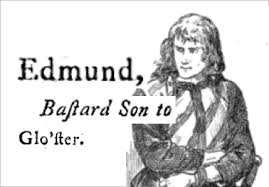Edmond:
Edmond is a villain - and we need villains to advance the plot, but Edmond is an interesting and almost sympathetic villain.
 At the beginning of King Lear, Edmond's father, Gloucester, admits that Edmond is his out-of-wedlock son that he has always "blushed" to acknowledge. Gloucester blames the boy's mother for having a son "ere she had a husband for her bed." Like Lear, Gloucester is another character who takes no responsibility for his actions and pays the price.
At the beginning of King Lear, Edmond's father, Gloucester, admits that Edmond is his out-of-wedlock son that he has always "blushed" to acknowledge. Gloucester blames the boy's mother for having a son "ere she had a husband for her bed." Like Lear, Gloucester is another character who takes no responsibility for his actions and pays the price.After Lear splits the country between Goneril and Regan, the state is weakened and the sisters compete with each other for Edmond. When there is division in a state or a relationship, a malefactor, like Edmond, can wedge himself in creating a wider division. I am reminded of modern-day Syria which, due to the civil war, became a breeding ground for ISIS.
Edmond has sent orders to have Lear and Cordelia killed while in prison. When he is captured, he tries to undo his order - his only redemptive act:
Some good I mean to do,
Despite of mine own nature. Quickly send
(Be brief in't) to the castle; for my writ
Is on the life of Lear and on Cordelia.
Nay, send in time.
General Woe:
The soldiers running to rescue Lear and Cordelia are too late.
Lear enters carrying Cordelia.
Howl, howl, howl, howl! O, you are men of stone.
Had I your tongues and eyes, I'ld use them so
That heaven's vault should crack. She's gone for ever!
I know when one is dead, and when one lives.
She's dead as earth.
Our present business is general woe.
These are sad times and must be so recognized. Our very business is grieving. Let's do nothing else. There is a formalness and authority in this declaration that I find helpful and comforting.
The weight of this sad time we must obey,
Speak what we feel, not what we ought to say.
The oldest have borne most; we that are young
Shall never see so much, nor live so long.
Love:
I began these meditations on King Lear by asking, "What's love got to do with it?" There's not a lot of love in King Lear. There is a great deal of anger, shouting, cursing, and howling.
One person who did not shout was Cordelia whose voice was ever "soft, gentle and low." That is not only "an excellent thing in a woman," it is a thing possible for anyone who is self-reflective, honest both to self and others, and responsible for their contribution, great or slight, to their own fate.
King Lear Part 2
No comments:
Post a Comment